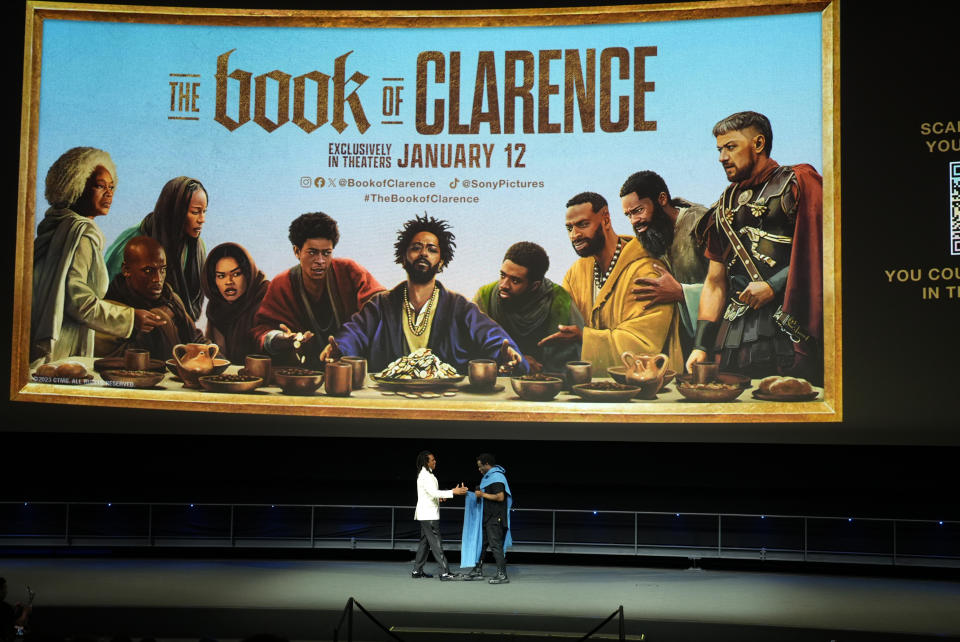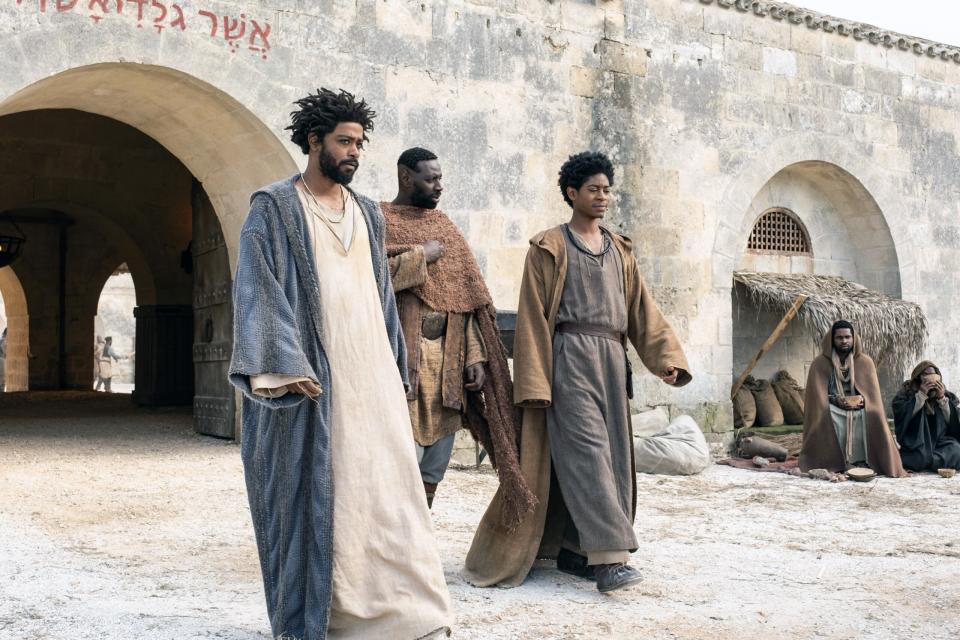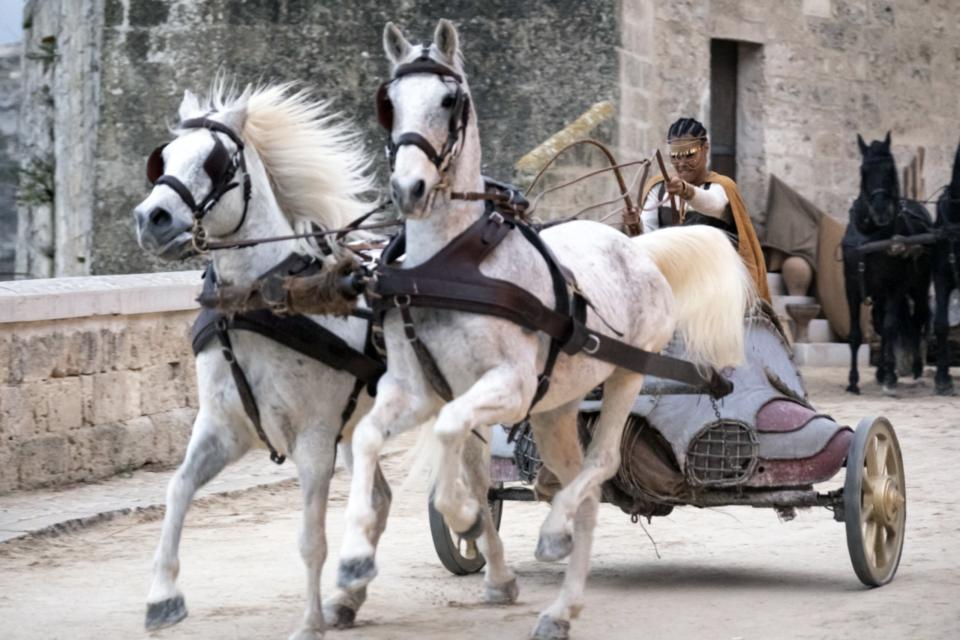‘The Book of Clarence’ Filmmaker Jeymes Samuel on Reviving the Biblical Epic and Getting D’Angelo and Jay-Z on a 9-Minute Track

SPOILER ALERT: This story contains spoilers from “The Book of Clarence,” now in theaters.
“The Book of Clarence” begins with a misdirect.
More from Variety
Box Office: 'Mean Girls' So Fetch With $11.6 Million Opening Day, 'Beekeeper' Buzzing in Second
Box Office: 'Mean Girls' Fetches $3.25 Million in Previews, 'The Beekeeper' Makes $2.4 Million
The sophomore feature of British musician-turned-filmmaker Jeymes Samuel, a biblical epic, opens with a crucifixion. The camera sweeps across a sun-streaked landscape where a dozen men are nailed to crosses. At the center of the gruesome assembly hangs a white man with a full beard and long brown locks — that must be Jesus of Nazareth, right? Not so fast.
The camera continues to move, pushing in closer and closer to the man until it suddenly swings right, resting on a Black man instead.
“I wanted to open the movie on the most striking image possible,” Samuel tells Variety. “You automatically assume that’s Jesus because of what we’ve been fed by Hollywood all our lives. It’s not in this movie, and it wasn’t in real life.”
Indeed, “The Book of Clarence’s” Jesus Christ is portrayed by Nicholas Pinnock — one of the few Black actors to have ever done so, underlining questions that have emerged in scholarly communities about the religious figure’s skin tone. But, on a more macro level, Samuel aims to portray Black people in an era in which they existed but are rarely depicted in entertainment – the same way his 2021 debut “The Harder They Fall” was a Western fronted by an all-Black cast.
Of course, Jesus Christ is not the film’s protagonist. That’s Clarence (LaKeith Stanfield), a down-on-his-luck man who, after running afoul of a local gangster, decides to capitalize on the rise of Jesus Christ by claiming to be a new Messiah. Samuel wrote, directed, produced and scored the satirical drama, conceiving the idea a decade ago before beginning to write the script in 2017. Samuel was inspired by biblical epics à la “Spartacus” and “Ben-Hur,” while also following the lineage of landmark “hood tales” and hang-out movies like “Do the Right Thing.”
“While I love those biblical epics, Black people are never in them. I see Yul Brynner and Charlton Heston. I love those actors, but they’re not Egyptian,” Samuel points out. “It was super important to tell a story that was based on the environment that I grew up in. It’s a local story — anyone can relate to it.”
Samuel was sure to include hallmarks of the genre, like following up the crucifixion scene — the first scene he wrote — with an illegal street race via chariot.
“When I was doing ‘The Harder They Fall,’ there was no way I wasn’t putting a train robbery and a jail break in that Western,” he says. “With ‘The Book of Clarence,’ there was no way I wasn’t putting gladiator fights, chariot races and crucifixions. I needed everything in this movie.”
Samuel is aware that “The Book of Clarence’s” premise is audacious. (“The church people began clutching their pearls when they watched the teaser,” he says with a laugh.) But he can’t really understand how it can be too much so. After all, storytelling begins with imagination.
“It’s just truth,” Samuel says, sketching out a scenario in which he and I are siblings living in biblical times. “I would have a chariot in my backyard, and I’d use your pony and ride around the streets.”
Thus, “The Book of Clarence,” he explains, is just a story about the world around the story of the Bible. And it’s one that he simply had to tell.
“I’d never seen myself in those movies,” Samuel concludes. “Hollywood stopped making them for everyone — forget Black and white — so it’s a perfect opportunity to put a different face on those tales.”

Everybody is talking about this nearly 10-minute track with D’Angelo and Jay-Z, which floats over a psychedelic scene when Clarence and Elijah (RJ Cyler) visit a hookah lounge. Jay-Z is a producer on the film, but how did you recruit D’Angelo, whose last wide release was in 2019?
The way it came together was godly. If your belief is God, then it was God; if your belief is the universe, then it was the universe. Because I’ve been wanting to work with D’Angelo my whole life. But you can’t just … no one knows where this guy is. It’s like you can want to work with Jay-Z your whole life, but whether you’re gonna work with him is a whole other thing.
So, the way it happened was me and D’Angelo just linking up on organic level, talking about all the things that interest us; all the things we want to do and the things we want to do together. Me being a fan of his and him being a fan of mine.
Did you tell D’Angelo about the scene or show him the sequence? What was the pitch?
D’Angelo’s last album was called “Black Messiah,” so he was already in full frequency of what the scene was, the song was, the message was, the ethos of the entire film. He lives in the frequency, so it’s just a perfect, perfect marriage.
The song, called “I Want You Forever,” is nine minutes and 33 seconds of what I call “soulful, biblical bliss.” It’s that joint we deserve. It’s that dope a song, if I may say so myself. And I wrote and produced it.

It’s not only Jesus and his disciples who are depicted, but the film is populated with many Biblical figures — Barrabas (Omar Sy), John the Baptist (David Oyelwo), Judas (Micheal Ward), Pontius Pilate (James McAvoy) and Mother Mary (Alfre Woodard). Did you worry about pushing the comedy too far and ruffling church folks’ feathers?
Well, the church people clutched their pearls when they watched the teaser. But if they watch the film, they’ll be holding the Bible high. It doesn’t blaspheme. I do have fun with that time and place, but I do pay total respect to those characters, then I also inform people of things they didn’t know.
Like, “Doubting Thomas” the apostle, Didymus, was a twin. And the Bible doesn’t say whether Thomas had a twin brother or sister; the twin is discarded even in the Bible. Which is why I chose the character of Clarence to be Thomas’ twin brother, to tell the story of an everyman whose brother has gone off to be an apostle.
I’m weaving a fictional tale around it, but the tale itself happened regularly. In Matthew 24:5, Jesus says, “Many will come in my name saying I am Christ and shall deceive many.” In Jesus’ time, there were 200-300 people saying they were the Messiah. The Bible speaks of Simon the Sorcerer, another false messiah that tried to buy his way into the apostles. The Romans used to gather all these people up, say “Do some miracles,” and then crucify them en masse.
So, “The Book of Clarence” is not necessarily a fictional story; he’s a fictional character, but the things that happen are documented historical incidents.
There’s a great line where Clarence says “I’ve got the cobblestones on lock.” This movie follows in line with many hood classics. How did you want to represent that?
We were always taking new phrases and making them old. Before that scene — I was like, “When you speak to these apostles and they’re looking down on you, how do you say ‘I’ve got the streets on smash?’” LaKeith went into full Clarence mode and said, “I’ve got the cobblestones on lock.”
The story of Jesus is a hood tale, just set in those days. He’s a guy in the hood who says he’s here to save all of us. He’s preaching on the mount and the police — the Romans — are after him. Jesus wasn’t rich; he didn’t live in a palace. He was a poor guy in the hood that doesn’t want money, that shuns all that stuff.
This [setting] is my neighborhood growing up. I held on to that truth and it made the drama with the Romans easy to write, because of the drama we had with the police. We know it so well. If you localize it and make yourself and your life the subject; you can understand how people felt being colonized by Rome.
As you mentioned, the movie kicks into high gear with an illegal chariot race between Clarence, Elijah and a super swaggy Mary Magdalene (Teyana Taylor). What did it take to pull off the chariot race?
First, you need the dopest actors, because they were really riding those chariots. And then you need the dopest stunt team and stunt choreographer, Phil Neilson, who did “Gladiator.” Then, there we were in Matera [where “The Passion of the Christ” also filmed], with LaKeith and Teyana whipping around the corner and us following them on a Technocrane. It was believable, but it was unreal.
Did you get on the chariot too?
When we shot “The Harder They Fall,” I never rode the horse once. I’m actually scared of horses; I always wonder if horses actually want us on their back.
But the first thing I did was get on the chariot! And what they don’t tell you is there’s no shock absorbers. You are on rocky [imitates bumping along the terrain] and you are hella bruised by the time you get off. But it’s so addictive. I must’ve ridden it like four times and then I couldn’t take it anymore. But LaKeith, RJ and Teyana were having the time of their lives. It took us four days so shoot, but it was intense and fun. Everyone needs to ride a chariot by the time they finish their filmmaking career.

Speaking of filmmakers, Deon Taylor (“Meet the Blacks,” “Blacula” reboot) posted on social media that he planned to buy out theaters for “The Book of Clarence,” Ava DuVernay’s “Origin” and Cord Jefferson’s “American Fiction.” What does that mean to you?
Deon has known me from before my career took off. We were in Sundance together with my debut short film “They Die by Dawn,” and all the things that we talked about then are happening now. It’s a beautiful thing to have other directors — especially directors that have come up alongside you — show solidarity. That’s how we should all be with each other.
Is the title of your third film hidden in this movie?
Peep this. I put “The Book of Clarence” in “The Harder They Fall” as an easter egg: “Like they say in ‘The Book of Clarence,’ can’t no man out-speed me.” [repeating a line Cyler’s character Beckwourth delivers midway through that film]. The first words Mary Magdalene says: “Can’t no man out-speed me.”
While the title of the third film isn’t hidden in this movie, the entire storyline of the film is. The entire roadmap to the movie is in this film. That’s the great thing about writing what you’re directing. You can just go in and have mad fun with the easter eggs.
Best of Variety
'House of the Dragon': Every Character and What You Need to Know About the 'Game of Thrones' Prequel
25 Groundbreaking Female Directors: From Alice Guy to Chloé Zhao
Sign up for Variety’s Newsletter. For the latest news, follow us on Facebook, Twitter, and Instagram.

 Yahoo News
Yahoo News 
